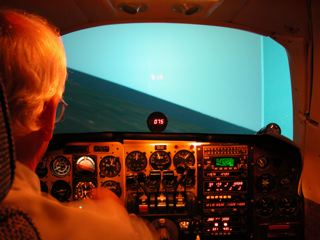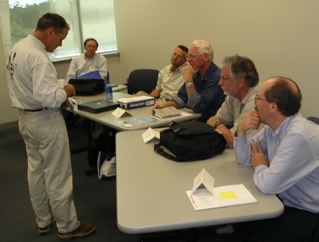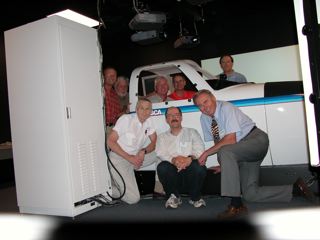By FRED W. SCOTT, JR.
North Garden, Virginia
Originally published October 2004 in the American Bonanza Society's
ABS Magazine,
Nothing beats training in your own airplane, but there are certain scenarios that simply cannot be accurately or safely trained in flight -- especially in multiengine airplanes. Further, even after attending and completing the Beechcraft Pilot Proficiency Program and other training resources available to Baron pilots, there's greater value in training for the more complex scenarios.
Optimally, experienced pilots could design their own training regimen for an advanced workout in a Flight Training Device (FTD, commonly called a simulator).
The seed for a Baron Graduate Seminar was planted through an Internet chatline discussion: "What scenarios are best flown in an FTD?" "What cannot safely be done in an airplane?" "What is often undone or untried during normal recurrent work?" "What the best way to learn to fly the complex, and varied, Circling Approach Procedures?" "What simulation facility might be willing to host Baron pilots for this do-it-yourself training?"
Dan Bindl, lead Baron instructor at Simcom in Orlando, Florida, was monitoring this chatline discussion. After kicking the idea upstairs, he replied that his facility -- operating both pre-1984 panel and "new panel" Baron FTDs with superb wrap-around visual displays -- would be happy to cater to a small group of Baron pilots who want to design a
program specifically tailored for advanced flying techniques and emergency practice.
The Baron Graduate Seminar was a "GO." It was planned for May 24-26, 2004, at Simcom in Orlando. Cost was $1,100 each paid to Simcom, which did not include hotel, meals and travel.

Scheduling Limitations: Even with two FTDs available at Simcom, only a very few pilots could participate. To provide any significant amount of sim time for the money and travel time, we limited the weekend program to six participants and ended up with a mix of one private pilot, a few with commercial certificates and several ATPs. All of us had well over 1,000 total hours and experience varied from 200 to more than 4,000 hours in Barons.
Most had attended the BPPP and had attended FlightSafety and/or Simcom programs (or done equivalent work in their airline simulators) where pilots can learn about Baron systems and maintenance. All participants were Baron owners and operators of private aircraft. Several were air taxi or trunk airline captains.
To avoid waste of time on techniques we could do safely in our aircraft, we agreed to focus on the types of extreme situations that are utterly unsafe to try in a real Baron. We ignored aircraft systems discussions, unless it was pertinent to the scenario, or someone had a question. We also avoided normal navigation tracking and holding, except for those who wanted an Instrument Proficiency Check (IPC) out of the course.
Scenarios: We flew the kind of emergencies that would be insane to try in an aircraft. We flew extreme unusual attitudes; successful IMC recoveries from inverted flight on partial panel and from above redline; spins and recoveries; engine-outs on partial and full panel and at night with compounding emergencies; very near zero-zero departures and
landings far below minimums-as a confidence-building exercise and an emergency procedure, successful landings after a double engine failure; deep stall and Vmc exploration; and successful landings with all flight controls inoperative, using only throttles, flaps and gear for control. Most participants also explored circling approaches at very low or "minimums" weather. Rarely flown in owner-flown airplanes and almost
impossible to practice in an airplane because it's so weather-dependent, we had discussed circling approaches on the chatline. This was the procedure that triggered the Seminar idea. We worked with very high winds and learned to make triple prelanding gear checks habitual. A beginning Baron pilot would have had a tough time, as some of
our emergencies were plenty hard on these experienced aviators, including me!
Pilot-Led Discussions: Somewhere in our planning, participants realized that among them they shared a tremendous  wealth of knowledge and information about
wealth of knowledge and information about
flying Barons in real-world situations. Filling the gaps between sim sessions, each pilot was responsible for an informal discussion on the topic(s) of his choice. Each was assigned 10 minutes for a quick review of some vital information or technique, followed by general discussion. The result was a truly unique cross-talk common in military and airline training programs, but almost unheard of in general aviation.
The FTD allowed safely practicing the deadly phase of instrument failure, identification, before transitioning to partial-panel flight.
* Bill Earls spoke on the transition from a Bonanza to a Baron.
* Larry Olson translated airline-style crew techniques into skills useful in a Baron.
* Bill Cannon talked about minor maintenance and its sometimes major effect-as in his experience when a nose strut fell off due to loss of a two-dollar bolt-and also reviewed engine monitor graphing software.
* Rick Boswell introduced his personal Baron Operations Manual as a risk-evaluation tool.
* Chris Shaker, a computer software designer from Oregon, covered use of a computer in aviation and flying the weather of the Pacific Northwest.
* I offered my experience on airborne weather radar and datalink weather services that are installed in my B55.
* The latest on engine management technique and leaning was also a hot topic among participants; several of us had attended the extraordinary in Ada, Oklahoma.
The varied experiences of the participating pilots added a lot to the program. We agreed that the seminar would have been even better with a little more structure and planning for these valuable nonflying times.
Not Alone: Of course, we were not left entirely to our own devices at Simcom. Initially, Dan Bindl and Rock Rockcastle were a bit unsure of what we wanted. After all, they normally work with a structured, carefully designed-and excellent-curriculum, which a few participants had completed previously. But as they got more comfortable with our
assembled expertise, they relaxed and helped in every way-pushing and stretching each one of us to do better. In each case, our performance significantly improved. We watched a private pilot build his skills up to ATP standards. Most impressive. They really allowed us to run the show. Although the weekend could have been a bit more structured to provide more preflight briefing, this was not the fault of the superb instructors who were
responding to our wishes to design our own experience. Next time, we will do it even better.
Rock and Dan  seemed perfectly willing to humor us, were always open to suggestions, and demonstrated an attitude that showed they wished to learn from us as well as instruct. They often made suggestions and added new insights that were quite helpful. They were extremely flexible and encouraged us to explore on our own.
seemed perfectly willing to humor us, were always open to suggestions, and demonstrated an attitude that showed they wished to learn from us as well as instruct. They often made suggestions and added new insights that were quite helpful. They were extremely flexible and encouraged us to explore on our own.
Participants in the seminar with me, as well as providing input for this article, were: Rick Boswell, Amherst, New Hampshire; Bill Cannon, Concord, North Carolina; Bill Earls, Naples, Florida; Larry Olson, Madeira Beach, Florida; and Chris Shaker, Bend, Oregon. We all agreed we would like to come back to Orlando and do it again in a year or two.
THE SEQUEL: that is exactly what happened. Every year since, the the Advanced Baron Seminar reassembles in Orlando; it has now grown to a two-session (eight pilots each) with one overlap day that includes all 16 Baron pilots.
++++++++++++++++
PARTICIPANT COMMENTS:
"Overall, I was very pleased with the training experience: great people, great equipment, great instructors and a great value."
"For a first-time deal, I thought it went quite well. There was a fine quality of participants, very good instructors and I was happy to be included."
"They "got it" and let me deal with my fears (techniques and situations I always had wondered if I could handle, but had never attempted in a real aircraft) and showed me that I could. It was a wonderful confidence-builder when I handled these scenarios successfully."
"I was very impressed with the thought that had gone into each hangar-flying presentation. All the pilots were all expert in various ways, with vastly differing total flight experience, yet all were fully qualified in Barons and in specific systems. So the mix of total experience was quite helpful."
"I arrived as a stranger to all, and departed with five new close friends. These men all left their egos at home, and all refused to get into an "I'm better than you" contest. It was heartwarming to see the genuine interest in the most experienced seeking to learn from the
experiences of those less so, and vice versa, of course. The better the skills, the more humble they seemed -- perhaps because they knew how bad things can get!"
"The Simcom non-motion simulators had excellent visuals, to the point that nausea could easily develop. They were actually quite realistic. We all hope ABS or BPPP will take this ball and run with it in some sort of joint venture with Simcom."
"I was really honored to be involved with such a fine bunch of folks and learned a bunch of great stuff. "
"By far, it's the best training on extreme emergency situations that I have had in a long, long time. It was comforting to leave with a sense that -- even when everything goes to hell -- there's a pretty good chance that I can still salvage the situation and save the passengers."






